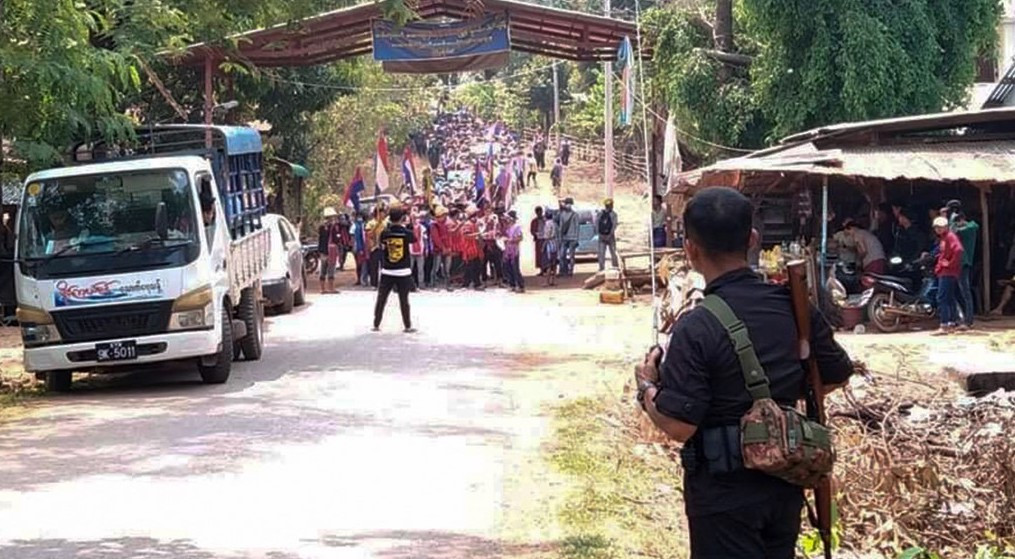Popular Reads
Top Results
Can't find what you're looking for?
View all search resultsPopular Reads
Top Results
Can't find what you're looking for?
View all search resultsTension rising in Myanmar between military, ethnic minorities
Those ethnic groups have long fought the military in seeking greater local autonomy in the Buddhist-majority but multiethnic country. Now some of the groups are providing protection to the protesters or attacking military bases.
Change text size
Gift Premium Articles
to Anyone
 This handout from Kawkareik Open News released to AFP on March 30, 2021 and taken on March 27, 2021 shows an armed member from the Karen National Union (KNU) ethnic group looking at protesters taking part in a demonstration against the military coup in Kawkareik township in Myanmar's Karen state. (AFP/Handout)
This handout from Kawkareik Open News released to AFP on March 30, 2021 and taken on March 27, 2021 shows an armed member from the Karen National Union (KNU) ethnic group looking at protesters taking part in a demonstration against the military coup in Kawkareik township in Myanmar's Karen state. (AFP/Handout)
T
ensions have been rising in Myanmar between armed ethnic minority groups and the military since the latter seized power in a coup last month, sparking massive anti-coup demonstrations across the country.
Those ethnic groups have long fought the military in seeking greater local autonomy in the Buddhist-majority but multiethnic country. Now some of the groups are providing protection to the protesters or attacking military bases.
As pro-democracy forces call on these groups to join hands, the military has conducted airstrikes in an area in eastern Kayin State controlled by the Karen National Union armed ethnic minority group.
"If possible, I would want to keep my stay temporary," a 53-year-old man said in Mae Hong Son, a northwestern Thai province that borders Myanmar, after crossing a river by boat from Kayin.
On Saturday, the military began airstrikes on the area he fled, in retaliation for a KNU attack on one of its bases earlier. About 5,000 people have since fled to neighboring Thailand, according to a Thai official.
In Myanmar there are about 20 insurgent forces. Of those, 10 groups such as the KNU have forged a cease-fire deal with the government.
The 10 groups have supported a so-called civil disobedience movement through which workers have walked out of their workplaces in protest against the coup. The KNU has even provided protection to demonstrators.
The Committee Representing Pyidaungsu Hluttaw, a group set up by pro-democracy forces that oppose military rule, has been signaling to armed ethnic minority groups for possible cooperation.
Aung San Suu Kyi led a civilian government from 2016 until she was deposed in the Feb. 1 coup, pledging to give priority to forging peace with ethnic minority groups. But she was unable to make much progress on that front, leaving many people disappointed.
This time around, the CRPH, which consists mostly of members of Suu Kyi's National League for Democracy party and fashions itself as a provisional government, has made it clear it is ready to give ethnic minority groups greater local autonomy.
On March 17, the CRPH announced plans to write a new constitution based on federalism and remove from a list of terrorist groups and unlawful associations "all ethnic armed revolutionary organizations...which have been fighting for the establishment of a federal democratic union."
But the 10 ethnic minority groups that have forged a cease-fire deal with the government are hardly united.
Khun Okka, the 74-year-old leader of the Pa-O National Liberation Organization, which forged the deal in 2015, said the group is in conflict with the military, not the CRPH. He said his group must prepare for necessary dialogue with the military.






